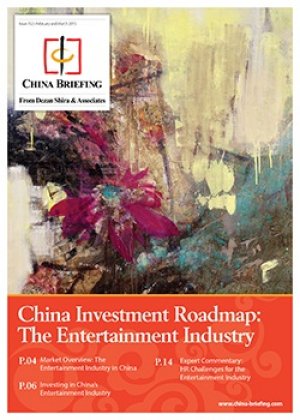State by State: China and California Trade
California is the most populous U.S. state and the third largest state by area. The Golden State owns three of the largest seaports in the world, making it the Pacific Rim’s global gateway and the number one state in the U.S. for attracting foreign direct investment.
California has the world’s eighth-largest economy, overtaking Italy with a GDP of US$ 2.31 trillion in 2014. The state is considered the nation’s leader in industries such as agriculture, computer technology, aerospace technology, film/entertainment industry and tourism.
Trade and Exports with China
International trade and investment is a major economic engine for California. In 2014, California exported to 229 foreign markets with a total export value of over US$174 billion. Among these, California’s exports to China exceeded US$16 billion, making China its third-largest export partner. Computers and electronic products accounted for nearly 28 percent of exports to China. Other major exports include waste & scrap, transportation equipment, machinery and chemicals.
In 2013, California reopened its trade office in Shanghai, as the state is trying to attract more investment from the world’s second-biggest economy. Four deals worth nearly US$300 million were signed between Chinese and Californian companies during the office’s opening ceremony, covering the areas of pharmaceuticals, technology and renewable energy. Furthermore, China’s National Development and Reform Commission (NDRC) and the state of California signed an agreement on climate change, which mainly aims to enhance cooperation between the two on low carbon development and business exchanges. With the state’s decision to reopen its trade office in Shanghai, California companies interested in expanding their operations will be able to find huge opportunities in China’s emerging industries.
Investment Opportunities
Hollywood has always been the heart of the entertainment industry. However, Hollywood has been losing its competitiveness in recent years due to comparatively high production and labor costs. Meanwhile, the entertainment industry in China has seen explosive growth (an expected CAGR of 17 percent between 2010-2015), growing at a much faster pace than the overall economy.
China has gradually relaxed previous restrictions on its film and entertainment industries. Specifically, China provides foreign investors with a package of tax incentives, including a five-year tax exemption on income derived from the distribution of Chinese films to rural areas and related copyright transfers. Similar tax breaks on film distribution have already been proposed for urban areas, especially in western China, where much of the country’s rapid construction of new cinemas is concentrated.
However, foreign investors will need to have a Chinese local partner to engage in theater construction and operation, as well as radio, television program and film production. Investors are also required to obtain the government pre-approval for construction and operation of large theme parks. Given the uneven development of China’s entertainment sector, foreign film production and entertainment companies are advised to focus on the more mature markets of China’s coastal regions, at least for the moment.
![]() RELATED: China’s Film Industry: Strategic Opportunities
RELATED: China’s Film Industry: Strategic Opportunities
Tourism
With the rise of income levels in China, outbound tourism has become one of the most profitable operations for China’s travel agencies. Interestingly, California is the top U.S. destination for Chinese visitors. Though foreign-invested travel agencies are not permitted to engage in overseas travel for Chinese mainland residents, new opportunities can now to be found in the newly-established free trade zones. For instance, Sino-foreign equity joint venture (EJV) travel agencies are allowed to engage in outbound tourism specifically in the Shanghai FTZ. Meanwhile, in the Tianjin FTZ, eligible Sino-foreign EJVs may organize overseas travel to locations other than Taiwan. Foreign-invested travel agencies seeking to provide overseas travel services also need to meet specific criteria, such as two years of operations in China and a minimum registered capital of RMB 300,000.
Tax Treaty – US Trade with China
The United States has signed a Double Tax Treaty with China. This can reduce tax burdens under certain circumstances in both trade and any China legal establishment. Please seek professional advice for specific China investment requirements. Treaty details can be found here.
Further Support from Dezan Shira & Associates
Dezan Shira & Associates can service California-based companies that are looking to further develop their operation in China. The firm can help companies establish a direct office in the country and can guide them through the affiliated tax, legal and HR issues that come with doing so. To arrange a free consultation, please contact our U.S. office at usa@dezshira.com.
|
Asia Briefing Ltd. is a subsidiary of Dezan Shira & Associates. Dezan Shira is a specialist foreign direct investment practice, providing corporate establishment, business advisory, tax advisory and compliance, accounting, payroll, due diligence and financial review services to multinationals investing in China, Hong Kong, India, Vietnam, Singapore and the rest of ASEAN. For further information, please email china@dezshira.com or visit www.dezshira.com. Stay up to date with the latest business and investment trends in Asia by subscribing to our complimentary update service featuring news, commentary and regulatory insight. |
![]()
China Investment Roadmap: The Entertainment Industry
In this special edition China Briefing Industry Report, we cast our gaze over the broad landscape of China’s entertainment industry, identifying where the greatest opportunities are to be found and why. Next, we detail some of the most important issues for foreign investors to be aware of, including legal, regulatory, and tax considerations specific to the industry. Lastly, we provide an insider analysis of the sector’s unique HR & payroll challenges.
 Revisiting the Shanghai Free Trade Zone: A Year of Reforms
Revisiting the Shanghai Free Trade Zone: A Year of Reforms
In this issue of China Briefing, we revisit the Shanghai FTZ and its preferential environment for foreign investment. In the first three articles, we highlight the many changes that have been introduced in the Zone’s first year of operations, including the 2014 Revised Negative List, as well as new measures relating to alternative dispute resolution, cash pooling, and logistics. Lastly, we include a case study of a foreign company successfully utilizing the Shanghai FTZ to access the Outbound Tourism Industry.
Using China’s Free Trade & Double Tax Agreements
In this issue of China Briefing, we examine the role of Free Trade Agreements and the various regional blocs that China is either a member of or considering becoming so, as well as how these can be of significance to your China business. We also examine the role of Double Tax Treaties, provide a list of active agreements, and explain how to obtain the tax minimization benefits on offer.
- Previous Article Prodotti BIO: come investire nel crescente mercato cinese del cibo sano
- Next Article ASEAN Guide Released With Full China FTA & Trade Details













